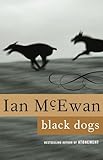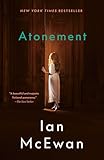I’m not a completist by nature or inclination. Even if I enjoy a novel or album a great deal, I tend to let chance determine what the next thing is I’ll read or listen to. There are very few artists whose entire catalog I’ve ever felt compelled to digest: Kubrick, The Beatles, most Alice Munro, possibly no one else. And, for reasons I’m not sure I fully understand, Ian McEwan, whom I began to read in my early 20s, and whom I’ve doggedly continue to follow, recently finishing his latest, Machines Like Me. His fifteenth: fifteen of this man’s books I’ve read, and having recently taken note of my unusual McEwan completism, it seemed worth thinking about the new novel in the context of his body of work, the only prolific author for whom I could attempt to do so.
It’s difficult to think of a writer with a more interesting, and in many ways desirable, career trajectory than Ian McEwan. His debut novel, The Cement Garden, published in 1978, was a Grand Guignol tale of death and incest, an unnatural (or perhaps all too natural) relationship that develops between a sister and brother when their parents die and they are left with their younger siblings in the house. It is a very good book: by turns funny, frightening, and powerfully creepy.



Creepiness is a theme that runs through the early part of McEwan’s corpus, a body of work that earned him the nickname Ian Macabre. There is the creepiness of incest in The Cement Garden, the creepiness of child molestation in the story collection First Love, Last Rites, the creepiness of child abduction in The Child in Time, the creepiness of serial murder in The Comfort of Strangers, and the creepiness of bestiality in Black Dogs. I don’t mean this pejoratively—while this urge to shock and disgust can sometimes mark out an immature writer, in the case of McEwan’s early work, the unnatural seems natural, less motivated by the urge to provoke than the urge to explore the limits of human behavior.



My sense is that a reader in the 1980s would have thought of him as an oddity, maybe Iain Banks with better style chops. My sense certainly is that a reader of this era would have been shocked to learn that, by the early 2000s, Mr. McEwan would be a standard bearer of popular literary fiction. A run of three novels—Amsterdam, Atonement, and Saturday—cemented his mainstream reputation as surely as The Cement Garden had cemented his fringe reputation. The one-word titling suggests a narrowing shift in intent, and indeed, I believe this mid-career makeover to be intentional, as much as such a thing is possible, anyway. These books trim away much of the gothic fat of the early work, and present a kind of streamlined, updated Victorian realism, especially in the runaway bestseller Atonement.
This is his high-water mark, the ideal synthesis of McEwan’s genre and literary talents. Atonement simultaneously manages to be a legitimate romance, a mystery, and a World War II narrative without sacrificing much in the way of stylishness or sentence-level pleasure. It is either the most highbrow middlebrow book ever written, or the most middlebrow highbrow (I mean this as a compliment), and the same could be said of Mr. McEwan’s general authorial talents. In an era of intense specialization and branding, it is the extremely rare writer who manages to wear as many hats as McEwan does, especially during this middle period.




Solar, published in 2010, inaugurated McEwan’s late phase, the one that is perhaps my least favorite of the three, despite the various pleasures it still reliably serves up. Like James Michener with states, these are McEwan’s Idea Books, each one easily articulable in terms of social problem or dramatic conceit: Solar (Climate Change); Sweet Tooth (MI5); The Children Act (Euthanasia); Nutshell (Hamlet as Performed by a Talking Embryo). And now, Machines Like Me (Robots), the title of which I find impossible not to subvocalize with the emphasis on like, briefly imagining a book about robots being fond of the narrator. The book is an alternate history in which technology and AI advanced faster than it has in our timeline, producing human simulacra by the early 1980s. The narrator, Charlie—for reasons that are not entirely clear, to us or to him—purchases a robot named Adam (the male robots are Adams, the females Eves; the book notes that seven Eves have been dispatched to Riyadh, a not very good joke). Adam, over the course of the proceedings, develops feelings of what he describes as love for Charlie’s romantic interest, Miranda. The novel proceeds as a bizarre love triangle, between the three, with extra bits of intrigue thrown in to move things along.
This plot machinery includes a secret backstory for Miranda involving a false rape allegation against a man named Gorringe as revenge for his actual rape of her friend Mariam. There’s also: her dying father, an orphan boy named Mark, Charlie’s use of Adam as a kind of automated day trader, and the recurring guest appearance of an Alan Turing who is still very much alive in this timeline. This accumulation of the exciting and implausible begins to feel a little—and it brings me no joy to say this—silly. The late-phase books all, to varying extents, have an aspect of the ridiculous to them; or an aspect of the fun, depending on one’s point of view. Machines Like Me joins its brethren in a genre unique to McEwan, one that as I read, I began to think of as “high-concept intellectual potboiler.”
The intellectual part should not be understated. Take, for
instance, this gorgeous passage, describing a moment, one of the novel’s best
scenes, when Miranda’s father mistakes Charlie for a robot:
There are occasions when one notices the motion of an object before one sees the thing itself. Instantly, the mind does a little colouring in, drawing on expectations, or probabilities. Whatever fits best. Something in the grass by a pond looks just like a frog, then resolves itself into a leaf stirred by the wind. In abstract, this was one of those moments. A thought darted past me, or through me, then it was gone, and I couldn’t trust what I thought I’d seen.
Even McEwan’s worst books, and this is not one of his worst, are full of this kind of writing, almost somnolently smooth and controlled. The command of language goes a long way toward pulling together the strings of material that, in a lesser writer’s hands, might feel completely absurd (that Nutshell, with its pithy, oratorical embryo of a narrator, was even partially successful, is a testament to McEwan’s ability). The book is also full of interesting, if not always bleeding-edge, ideas about AI and consciousness. Adam has a precocious teenager’s love for earnest philosophy, a tendency played for laughs, but one that also produces many genuinely interesting digressions:
He said, “I’ve also been thinking about vision and death…We don’t see everywhere. We can’t see behind our heads. We can’t even see our chins. Let’s say our field of vision is almost 180 degrees, counting in peripheral awareness. The odd thing is, there’s no boundary, no edge. There isn’t vision and then blackness, like you get when you look through binoculars. There isn’t something, then nothing. What we have is the field of vision, and then beyond it, less than nothing.”
“So?”
“So this is what death is like.”
Nonetheless, despite the book’s many pleasures, one senses in Machines Like Me, as to some extent is true in all these late-phase books, a master prioritizing his own amusement. McEwan is clearly intellectually curious, and these Idea Books are clearly fun: fun to research, fun to think about, fun to write. And, to be fair, pretty fun to read. Having already dominated the British literary landscape for more than a quarter century, having produced several bestsellers, having won the Booker and just about every award that can be won, it is difficult to begrudge the man his pleasure. Nonetheless, there is an aspect of the hobbyist to it, the retiree retreating to his basement to fool with model trains.
As a lifelong fan of McEwan’s, this reader—and I suspect others—pines for a late-late phase. One that sees him leave the playroom and evolve once more while recapturing his earlier form, returning to novels of the small and intent variety. It’s not impossible to imagine—as much as McEwan’s subject matter has changed from The Cement Garden to Machines Like Me, if you read closely, certain elements and preoccupations are consistent: human desire, the ramifications of sex, the violence that people can so easily do to each other. The creepiness of the earlier work is less intense, more diffuse, but it is still very much there. McEwan received a great deal of justified flack recently, for an interview in which he spoke about the possibilities of science-fiction exploring the ethical ramifications of AI, seeming unaware of Isaac Asimov and the last 50 years of the genre; that said, to my knowledge, until the publication of Machines Like Me, sci-fi had yet to explore the possibilities of robot-human cunnilingus. In a gobsmacking moment early on, Charlie listens to Miranda and Adam going at it in her apartment overhead and vividly imagines the scene:
Minutes later, I almost looked away as he knelt with reverence to pleasure her with his tongue. This was the celebrated tongue, wet and breathily warm, adept at uvulars and labials, that gave speech its authenticity.
This is, on the one hand, a somewhat insane thing to write, but on the other it is characteristic McEwan—the unblinking, simultaneously scientific and voyeuristic eye. Even stately Atonement, a sweeping historical tragedy set in a 1930s country manor, hinges on a vulgar love letter and features a sexual tryst that includes the word “membrane.” Yes, the creepiness of the early novels remains. It is a productive, idiosyncratic creepiness that I personally find more compelling than the big ideas of his last few novels.
This, perhaps, explains why 2006’s On Chesil Beach is my personal favorite of McEwan’s novels. It tells the story of a young married couple trying and failing to have sex on their honeymoon. That’s it. It is simple and heartbreaking, paring away almost all plot machinery, distilling McEwan’s thematic interests down to the essential: two people, and the question of how to exist together. Its creepiness is the greatest creepiness of all, one that Machines Like Me also explores, but in a much more labored and labyrinthine style: the inescapable reality of human consciousness—the way we are trapped in our own minds, never able to really know anyone else in the end.
The post Caring Is Creepy: Ian McEwan and ‘Machines Like Me’ appeared first on The Millions.
Source : Caring Is Creepy: Ian McEwan and ‘Machines Like Me’






